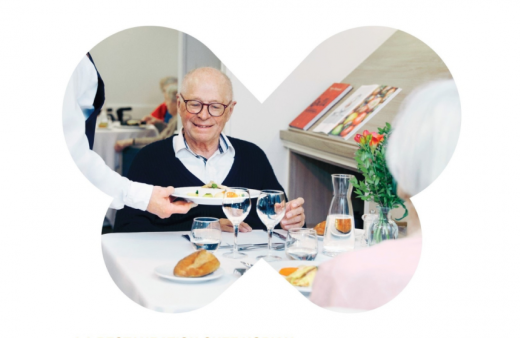Korian commits once again to Undernutrition Week

The National Week of Undernutrition’s third edition was held from November 18 to 25, 2022, as part of public efforts to raise awareness about a pathology that, in France, affects 2 million people each year. This widespread but little-known phenomenon particularly affects hospitalized and frail elderly people. In its various fields of activity, Korian intervenes on a daily basis with these populations, and is committed, throughout the year, in the fight against undernutrition by putting the emphasis on awareness and prevention in its facilities.
Instead of using the word “disease”, the French National Authority for Health (NAH) describes undernutrition as “the state of an organism in nutritional imbalance, characterized by a negative energy and/or protein balance.”
There are two types of undernutrition:
- exogenous, when it is mostly due to a lack of nutritional intake;
- endogenous, when it is linked to certain diseases such as colon or lung cancer, cystic fibrosis, Alzheimer's or
Parkinson's
What are the major risk factors for undernutrition?
According to the French Ministry of Health and Prevention, 2 million people in France suffer from undernutrition. Elderly and vulnerable people are particularly affected: 30% of hospitalized people and 40% of cancer patients are undernourished, as well as 400,000 elderly people at home and 270,000 in long-term care nursing homes.
Why are these populations more affected? Because of risk factors related to appetite and loss of autonomy. First of all, appetite generally decreases with age while nutritional needs remain constant. Furthermore, the aging process and neurodegenerative diseases like Alzheimer’s can impact one’s ability to eat, i.e. to maintain consistent meal times, to shop, cook etc. Finally, diseases such as cancer or cystic fibrosis - and their treatments, which are potentially heavy on the body - can cause nausea or a great fatigue, leading patients to lose the energy to eat.
These are typical situations where undernutrition can silently settle in, involving consequences on the body like vulnerability to infections, reduction in muscle mass... worsening the loss of autonomy. This phenomenon is well known from Korian teams, who are providing care to ageing and fragile populations on a daily basis to ensure the best possible prevention.
Preventing undernutrition, in our plates and in care pathways
In nusring homes or in clinics, Korian's teams are involved to take up the challenge of undernutrition all along the patients’ care pathways and/or stay. This starts with a screening of nutritional disorders (weighing, evaluation of food intake, blood tests...) and an initial evaluation of patients and residents in order to adapt the type of food to their needs.
The evaluation includes:
- life history and eating habits;
- chewing disorders or pathologies due to oral condition, that may reduce the appetite;
- ability to swallow in order to identify the risks of false routes;
- autonomy in taking meals, that may require human assistance;
- medication that may reduce appetite.
Information that maximizes the benefits of high-calorie, high-protein meals and snacks, emphasizing foods such as eggs, meat, poultry, fish, nut butters and cheeses with a minimum of 20% milk fat.
Beyond the plate, a fitting physical activity plays a major role in preventing the appearance of nutritional disorders. With that in mind, the Korian teams design specific programs in order to fight against the reduction of muscular mass and strength, and thus, to reduce autonomy loss.
Throughout the stay, the care team participates in monitoring their nutritional status (regular weight measurement, monitoring of food intake, etc.) so that the patients and the residents can combine care and pleasure of eating.
Finding health and pleasure in your plate
Healthy eating is not just about the nutrients you’ll find in your plate. It is also a matter of pleasure, a dimension that is all the more important for people who are losing their autonomy. Paying attention to the food presentation and its texture in order to adjust to the patients’ ability to chew or swallow, helps everyone maintain the pleasure of taste.
Thus, catering is a central point of Korian's service offer and aspires to make eating well a moment of pleasure and conviviality. This cuisine is rooted in the regions, designed and prepared in our facilities with in-season ingredients from local food networks:
- 100% of dairy products, butter, cream, milk, poultry and pork are French;
- 75% of food purchases are French;
- 98% of bakers are local;
- 35% of fruits and vegetables are purchased from local producers
To improve best practices in nutritional care, all of our facilities benefit from the support of the French KORIAN Food and Nutrition Liaison Committee (Comité de Liaison Alimentation Nutrition), led by the French Medical Department in conjunction with the Hotel trade and Food Service Department.
As a result, each year, more than 21 million meals are served in our facilities, prepared by 1,000 chefs and cooks with menus that respect the desires, tastes and choices of our residents. These are moments of sharing and enjoyment that play a key role in their daily lives, especially as the end of the year approaches and Christmas preparations begin.
To go further (all articles are in French)
- Hauté autorité de santé (HAS)
Diagnostic de la dénutrition chez la personne de 70 ans et plus
- Ministère de la Santé et de la Prévention
Semaine nationale de la dénutrition du 12 au 20 novembre 2021 : tous mobilisés
Programme national nutrition santé (PNNS) - Professionnels
- Lutte contre la dénutrition
La dénutrition en chiffres
- Manger bouger
La dénutrition
- Santé publique France
Nutrition et activité physique
